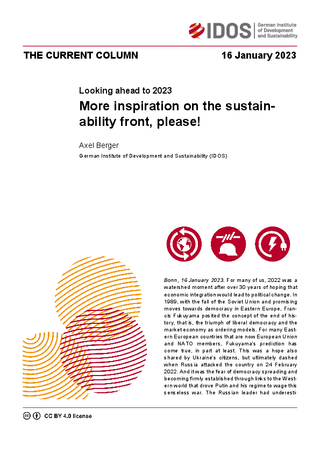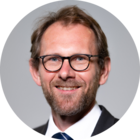Looking ahead to 2023
More inspiration on the sustainability front, please!
Berger, AxelThe Current Column (2023)
Bonn: German Institute of Development and Sustainability (IDOS), The Current Column of 16 January 2023
Bonn, 16 January 2023. For many of us, 2022 was a watershed moment after over 30 years of hoping that economic integration would lead to political change. In 1989, with the fall of the Soviet Union and promising moves towards democracy in Eastern Europe, Francis Fukuyama posited the concept of the end of history, that is, the triumph of liberal democracy and the market economy as ordering models. For many Eastern European countries that are now European Union and NATO members, Fukuyama’s prediction has come true, in part at least. This was a hope also shared by Ukraine’s citizens, but ultimately dashed when Russia attacked the country on 24 February 2022. And it was the fear of democracy spreading and becoming firmly established through links to the Western world that drove Putin and his regime to wage this senseless war. The Russian leader had underestimated the tenacity of the world’s democracies, instead expecting to find them weak and indecisive. The level of unity displayed by the members of the G7, NATO and the European Union is one of the few glimmers of hope I have witnessed over the past year.
Is it Eurocentric to place Russia’s war against Ukraine at the heart of our political discourse? This is the claim being made in the capitals of many low- and middle-income countries. The sense of threat being experienced in Berlin, Warsaw and Bucharest is far more immediate than that in Delhi, Pretoria and Dakar. We must also give serious consideration to accusations of applying double standards to crises and wars in other countries, from Iraq to Libya. At the same time, the impact of the Russian war is undoubtedly global in nature, affecting food and fertiliser supplies worldwide, for example. Additionally, by engaging in this war of aggression and committing mass war crimes in places such as Bucha, Russia is trampling international humanitarian law and the multilateral legal order under foot. The attack on Ukraine is exacerbating humanitarian crises and reversing progress made towards achieving the Sustainable Development Goals (SDGs), progress that had already ground to a halt due to the coronavirus pandemic. It is this polycrisis of interlinked and mutually reinforcing crises that will also shape 2023.
In Germany, we need to redouble our efforts to drive the energy transition if we are to reduce our dependence on fossil fuels, which we often import from authoritarian regimes. We should also rethink our value chains to make them more resilient overall. This does not necessarily mean de-globalising them or aggressively decoupling them from China, as the United States is doing, but rather focusing on diversifying imports of critical commodities and primary products, as well as sales markets. Greater attention should also be paid to negative spillover effects, that is, undesirable economic, social, environmental and security-policy impacts from industrialised nations, such as Germany, that undermine the achievement of the SDGs in other countries. These transformation processes should always be coordinated with our European partners, as this is the only way to imbue economic and sustainability reforms with the global gravitas they require.
The next SDG Summit is set to be held in September 2023. It sees heads of state and government come together every four years to review achievement of the SDGs. We are currently half way through the period for implementing the 2030 Agenda and its 17 SDGs. Germany needs to provide both national and international impetus for accelerating implementation of the Agenda, especially since the Federal Government has joined Namibia in assuming joint leadership of negotiations on the Summit of the Future agenda. This summit, due to take place in 2024, will develop reform options for the United Nations and the international system with a view to achieving global sustainable development.
Germany also needs to play a constructive and transformative role in other international forums. The next three years will see the G20 Presidency held by India, Brazil and South Africa, following Indonesia’s term of office last year. This Southernisation of the G20 is only logical, given the political significance of these nations, and could shine a spotlight on the challenges faced by low- and middle-income countries. As holder of the G7 Presidency in 2022, Germany provided key impetus on a number of fronts, not least by establishing the Global Alliance on Food Security and the Partnership for Global Infrastructure and Investment. Given the mounting debt of many low- and middle-income countries, however, the G20 is the right forum for advancing debt restructuring and debt relief efforts, which free up public funding to promote sustainable development. Germany will need to step up its work as a driving force and an implementor at regional and global level in 2023 and beyond in order to promote peace, international law and sustainable development. This will require bold, practical action, not just good intentions.


